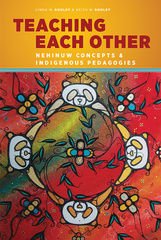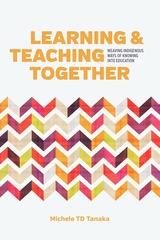
Knowing the Past, Facing the Future
Indigenous Education in Canada
In 1867, Canada’s federal government became responsible for the education of Indigenous peoples: Status Indians and some Métis would attend schools on reserves; non-Status Indians and some Métis would attend provincial schools. The system set the stage for decades of broken promises and misguided experiments that are only now being rectified in the spirit of truth and reconciliation.
Knowing the Past, Facing the Future traces the arc of Indigenous education since Confederation and draws a road map of the obstacles that need to be removed before the challenge of reconciliation can be met. This insightful volume is organized in three parts. The opening chapters examine colonial promises and practices, including the treaty right to education and the establishment of day, residential, and industrial schools. The chapters in Parts 2 and 3 are written alternately from within Indigenous and Western paradigms. Parts 2 focuses on the legacy of racism, trauma, and dislocation; Part 3 explore contemporary issues in curriculum development, assessment, leadership, and governance.
At a time when decolonizing Canada’s education system remains a struggle, this innovative collection reveals the possibilities and potential pitfalls associated with incorporating Traditional Knowledge and Indigenous teaching and healing practices into school courses and programs.
This book is essential reading for administrators, teachers, policy makers, and anyone invested in Indigenous education and the survival and success of future generations.
This book provides innovative reflections on long-standing issues in Indigenous education in Canada and suggests possible pathways to address the educational debt that Canada owes Indigenous peoples. I recommend it to educators, students, and administrators, to anyone interested in learning about the history of residential schools, and to all readers who are interested in reconciliation and decolonisation.
There is no doubting the importance of the subject tackled by this edited collection... In eleven highly diverse chapters, plus a substantial introduction by editor Sheila Carr-Stewart, this collection seeks to shed light on the mechanisms of educational exclusion and sound out the prospects for a different kind of education in the future.
Readers who are new to the topic, such as practicing teachers who wish to enhance their responsiveness to Indigenous students or undergraduate history majors, will gain accessible historical and policy context, alongside complex and nuanced representatios of the challenges that pervade Indigenous education today.
Knowing the Past, Facing the Future is critical reading for those invested in Indigenous education, as all Canadians ought to be. By confronting colonialism and racism as they intersect with reconciliation, the contributors of this collected work address the role and responsibility of education in decolonizing a society. I recommend this book be read by all educators.
New and seasoned readers to Indigenous education in Canada will value how the authors tackle old issues in new ways, uncover challenges that have been ignored, and present innovative possibilities that learn from the past for a much better future.
This must-read collection of essays provides needed historic reflections on treaties and Indigenous peoples’ aspirations for education, and much needed insight, support, and research to address the reconciliation agenda and correct the longstanding educational debt owed Indigenous peoples.
An important book for students, educators, and administrators who want to understand the colonial history of First Nations education in Canada and help create a better future.
Sheila Carr-Stewart is a professor emerita at the College of Education at the University Saskatchewan and teaches in the Faculty of Education at the University of Alberta. A former teacher, she has worked extensively in the area of Indigenous education, particularly on issues related to jurisdiction, administration, funding, and local control of community schools. In 2013, she received the University of Saskatchewan Provost’s Award for Teaching and Research Excellence in Aboriginal Education.
Contributors: Jonathan Anuik, Michael Cottrell, Karlee D. Fellner, Rosalind Hardie, Darryl Hunter, Harry Lafond, Solange Lalonde, Brooke Madden, Yvonne Poitras Pratt, Jane P. Preston, Larry Prochner, Noella Steinhauer
Introduction / Sheila Carr-Stewart
Part 1: First Promises and Colonial Practices
1 “One School for Every Reserve”: Chief Thunderchild’s Defence of Treaty Rights and Resistance to Separate Schools, 1880–1925 / Sheila Carr-Stewart
2 Placing a School at the Tail of a Plough: The European Roots of Indian Industrial Schools in Canada / Larry Prochner
3 The Heavy Debt of Our Missions: Failed Treaty Promises and Anglican Schools in Blackfoot Territory, 1892–1902 / Sheila Carr-Stewart
Part 2: Racism, Trauma, and Survivance
4 If You Say I Am Indian, What Will You Do? History and Self-Identification at Humanity’s Intersection / Jonathan Anuik
5 Laying the Foundations for Success: Recognizing Manifestations of Racism in First Nations Education / Noella Steinhauer
6 Iskotew and Crow: (Re)igniting Narratives of Indigenous Survivance and Honouring Trauma Wisdom in the Classroom / Karlee D. Fellner
Part 3: Truth, Reconciliation, and Decolonization
7 Curriculum after the Truth and Reconciliation Commission: A Conversation between Two Educators on the Future of Indigenous Education / Harry Lafond and Darryl Hunter
8 Indigenous and Western Worldviews: Fostering Ethical Space in the Classroom / Jane P. Preston
9 Supporting Equitable Learning Outcomes for Indigenous Students: Lessons from Saskatchewan / Michael Cottrell and Rosalind Hardie
10 Hybrid Encounters: First Peoples Principles of Learning and Teachers’ Constructions of Indigenous Education and Educators / Brooke Madden
11 The Alberta Métis Education Council: Realizing Self-Determination in Education / Yvonne Poitras Pratt and Solange Lalonde
Index















